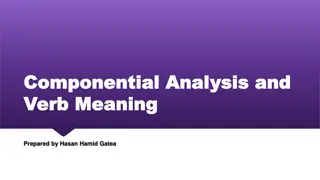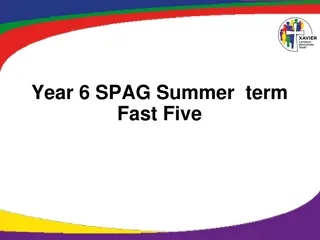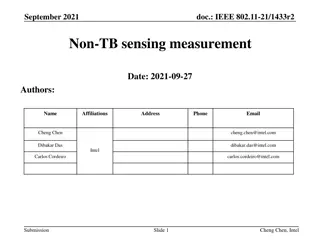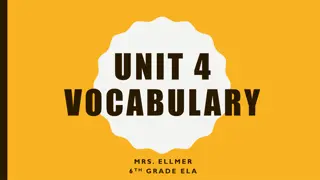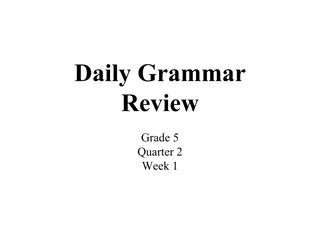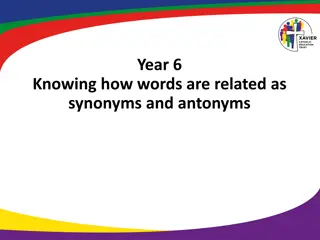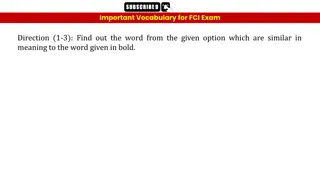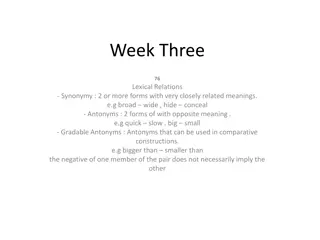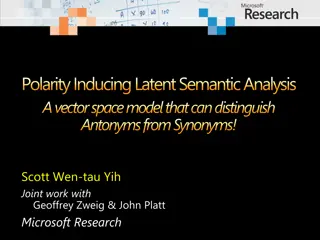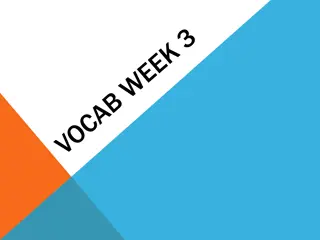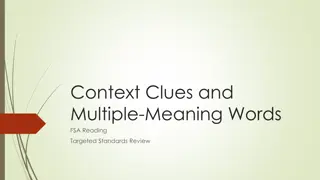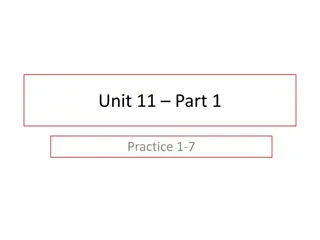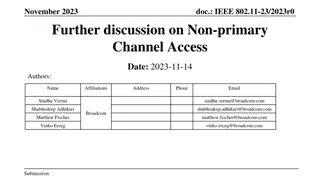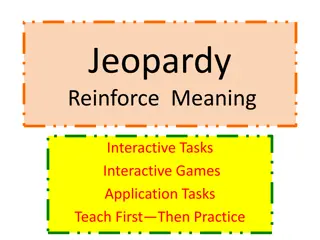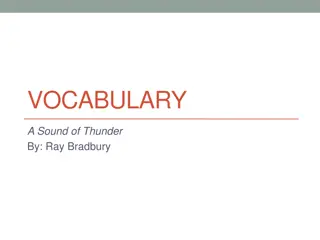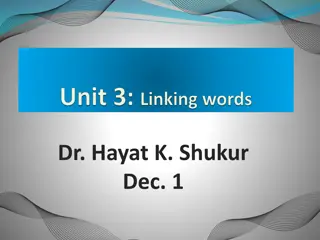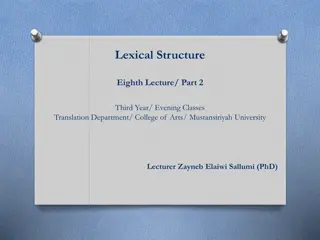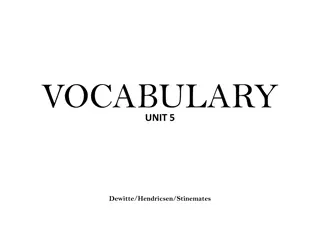Enhancing Literary Comprehension Through Interactive Learning Activities
Engage students in a dynamic English class led by Senior Teacher Jahangir Alam. Dive into the world of Count Wisely with interactive lessons, vocabulary exercises, and engaging storytelling. Explore the power of words with synonyms, antonyms, and sentence structures. Foster a deep understanding of l
7 views • 20 slides
Understanding Lexical Sense Relations and Word Meanings
Investigating sense relations between words involves exploring synonyms, antonyms, hyponymy, and meronymy to understand the meanings of words in different contexts. By examining semantic similarities and syntactic relationships, one can better comprehend how words relate to one another, leading to a
1 views • 28 slides
Understanding Componential Analysis in Semantics
Componential analysis is a significant theory that emerged in the 20th century to analyze words based on semantic features. It helps identify word meanings by examining components and their features. This method involves representing features as either positive (+), negative (-), or unspecified (.).
0 views • 22 slides
Understanding Vocabulary through Context Clues
Learn how to decipher unfamiliar words by identifying context clues such as definitions, synonyms, antonyms, and comparisons. Examples and visual aids demonstrate how these clues help in understanding the meaning of unknown words in sentences.
0 views • 17 slides
Establishing Safety Standards in Non-Movement Areas at Smith Reynolds Airport
This guide outlines the purpose, definitions, rules, and safety measures for operating vehicles in non-movement areas at Smith Reynolds Airport. It emphasizes standardized ground movement practices to ensure the safety of airport patrons, reduce the risk of injury, and maintain a high level of safet
1 views • 12 slides
Understanding Lexical Relations: Synonyms, Antonyms, Hyponymy, and Prototype
Explore the concepts of synonyms, antonyms, hyponymy, and prototype in lexical relations. Learn how closely related words can be substituted for each other, understand opposites, inclusion in meanings, and characteristic instances in word categories.
0 views • 12 slides
Understanding Non-Aqueous Solvents: Types and Classification
Inorganic non-aqueous solvents play a crucial role in chemical research and industry. This article by Dr. Princy K.G. delves into the classification of solvents based on protonicity, polarity, and aqueous vs. non-aqueous nature. It explores the types of non-aqueous solvents, such as protonic and non
1 views • 29 slides
Enhancing Vocabulary with Antonyms Guide
Explore the world of antonyms and learn how they enrich our language. Discover the power of identifying and using antonyms to enhance your vocabulary and writing skills. Uncover the importance of opposites in expanding your language proficiency and mastering English.
0 views • 11 slides
Enhancing Vocabulary Skills Through Synonyms and Antonyms Practice in English
Explore a series of passages focusing on enhancing vocabulary skills by identifying synonyms and antonyms in English language usage. Engage with exercises that challenge your understanding and application of word meanings, offering insights into expanding your linguistic proficiency. Practice contex
0 views • 12 slides
Year 6 SPAG Summer Term Fast Five Activities
This resource covers various language activities for Year 6 students including adding prefixes and suffixes, using words in different forms, identifying pronouns, synonyms, antonyms, punctuation, plurals, and correcting spellings. It also includes answers for self-assessment.
0 views • 34 slides
Understanding Antonyms: Types and Examples
Antonyms are words with opposite meanings, such as alive/dead, big/small, and happy/sad. They are categorized into gradable and non-gradable types, each serving distinct linguistic functions. While gradable antonyms can be used comparatively, non-gradable antonyms do not allow for such comparisons.
0 views • 34 slides
Weekly Language Review Week 12
This week's language review includes exercises on simplifying sentences, identifying misspelled words, understanding figures of speech, and differentiating between phrases, independent clauses, and dependent clauses. It also covers definitions, word roots, eliciting responses, punctuation, and anton
0 views • 20 slides
Understanding Non-Firm Quantities in Electricity Markets
Non-Firm Quantities in electricity markets involve units with non-firm access not being compensated for their non-firm capacity not getting accommodated on the system. The concept of Firm Access Quantity plays a key role in determining compensation levels for units, with differences in implementatio
0 views • 6 slides
Understanding Non-Compete Agreements: Enforceability and Requirements
Non-compete agreements are commonly used in the United States to protect businesses from competition by former employees. To be enforceable, these agreements must meet certain requirements, including independent consideration, protection of legitimate business interests, and reasonableness in scope,
0 views • 26 slides
Understanding Antonyms: Types and Examples
Antonyms are words with opposite meanings, such as alive/dead, big/small, hot/cold. They are categorized as gradable or non-gradable based on their usage. Gradable antonyms can be compared, while non-gradable antonyms do not allow for comparison. The negative test helps identify non-gradable antonym
2 views • 34 slides
Comparison of Trigger-based vs. Non-Trigger-based Sensing Measurement in IEEE 802.11
The document discusses the differences between Trigger-based (TB) and Non-Trigger-based (Non-TB) sensing measurement instances in IEEE 802.11 standards, focusing on who initiates the sensing measurement. TB sensing is initiated by the AP, while Non-TB sensing is initiated by a non-AP STA, enabling o
6 views • 13 slides
Understanding Global Warming Impacts in English Class Lesson
In this English class lesson, students learn about the dangers of global warming and its impact on the world. They study how extreme heat is melting ice, leading to rising sea levels and potential future flooding of land. The lesson covers topics such as the effects of climate change on food product
0 views • 12 slides
Unit 4 Vocabulary - Mrs. Ellmer 6th Grade ELA
Explore key vocabulary words from Unit 4 in Mrs. Ellmer's 6th-grade English Language Arts class. Learn the definitions, synonyms, and antonyms of words like "acquit," "deem," "devastate," "discredit," "elusive," "generate," "idolize," and "ingratitude" with visual aids for better understanding.
0 views • 21 slides
Grade 5 Quarter 2 Week 1 Daily Grammar Review
Engage in daily grammar practice with exercises focusing on sentence structure, word order, rhyming words, homophones, prepositional phrases, synonyms, antonyms, adverbs, dates, and identifying parts of speech. Improve your grammar skills progressively through the week.
0 views • 60 slides
Understanding Context Clues for Word Meaning
Explore the concept of context clues in understanding the meanings of words and phrases, with examples and explanations of synonyms, antonyms, and more. Enhance your vocabulary skills by learning how to infer word meanings based on surrounding text.
0 views • 12 slides
Enhancing Writing Skills with Synonyms and Antonyms
Explore the importance of synonyms and antonyms in improving writing skills by understanding how words are related, with examples and exercises provided to practice identifying synonyms and antonyms. Discover the power of vocabulary expansion through word relationships.
0 views • 7 slides
Important Vocabulary for FCI Exam - Synonyms and Antonyms Practice
Enhance your vocabulary skills for the FCI exam with practice questions on synonyms and antonyms. Test your understanding of words like Embedded, Contemplate, and Disproportionate by finding similar or opposite meanings to improve your word knowledge.
0 views • 109 slides
Understanding Lexical Relations in Linguistics
Different types of lexical relations such as synonymy, antonyms, hyponymy, homophony, and homonymy play a crucial role in understanding the nuances of language. Synonyms have closely related meanings, antonyms have opposite meanings, while hyponymy and hypernymy show hierarchical relationships betwe
0 views • 4 slides
Unveiling Polarity with Polarity-Inducing Latent Semantic Analysis
Polarity-Inducing Latent Semantic Analysis (PILSA) introduces a novel vector space model that distinguishes antonyms from synonyms. By encoding polarity information, synonyms cluster closely while antonyms are positioned at opposite ends of a unit sphere. Existing models struggle with finer distinct
1 views • 29 slides
Understanding Lexical Relations in Language
Explore the concepts of synonymy, antonymy, hyponymy, and prototype in linguistics. Learn about words with closely related meanings (synonyms), opposite meanings (antonyms), inclusive meanings (hyponyms), and characteristic examples (prototypes) within lexical relations.
0 views • 12 slides
Vocabulary Study - Words and Definitions
This study guide provides definitions, parts of speech, synonyms, antonyms, and sentences for the words "admonish," "breach," "brigand," and "circumspect." Learn the meanings of these words and enhance your vocabulary skills for homework or personal development.
0 views • 22 slides
Learning Vocabulary with Visual Examples
Explore vocabulary words such as "ordinary," "control," "cage," "upset," "sensible," "confused," "training," and "suspiciously" through engaging visual examples. Enhance your understanding of each word's meaning, synonyms, antonyms, and usage in sentences.
0 views • 9 slides
Vocabulary Enrichment with Visual Aid
Enhance your vocabulary with visual representations of words like "flippant," "culminate," "prolific," "agitation," "animosity," "transgressor," "benign," and "pensive." Each word is paired with its definition and antonyms, making learning engaging and effective.
0 views • 9 slides
Contemporary Challenges in Nuclear Disarmament and Non-Proliferation Regime
The international regime for nuclear disarmament and non-proliferation faces challenges from states within and outside the regime, as well as non-state actors. Various approaches are being utilized to address these challenges, including strengthening multilateral institutions, non-treaty-based multi
0 views • 12 slides
Improving Attainment and Progress of Disadvantaged Pupils in Sheffield
Attainment and progress of disadvantaged pupils in Sheffield show an improving trend across key stages, although the gaps between disadvantaged and non-disadvantaged students are not closing fast enough. Data suggests that disadvantaged pupils with low prior attainment are making better progress in
0 views • 29 slides
Understanding Non-Profit Accounting Essentials
Learn the basics of non-profit accounting, including what defines a non-profit organization, common types of non-profits, governance structures, and legal responsibilities. Discover key insights on IRS and state requirements for non-profits in this informative presentation by Jessica Sayles, CPA fro
0 views • 55 slides
Understanding Context Clues for Effective Reading Comprehension
Context clues are hints within a text that assist readers in understanding the meaning of unfamiliar words. They can be found in definitions, surrounding sentences, synonyms, antonyms, and cause-and-effect relationships. By recognizing and utilizing context clues, readers can enhance their comprehen
0 views • 15 slides
Understanding Analyticity and Antonymy Concepts
Explore concepts like analyticity, paraphrases, antonymy, and binary antonyms in this practice exercise. Learn about sense relations, contradictory statements, and word opposites. Dive into identifying binary antonyms and understanding four-way contrasts. Enhance your understanding of semantics and
0 views • 39 slides
Further Discussion on Non-primary Channel Access in IEEE 802.11
This contribution delves into the utilization of non-primary channels for access in IEEE 802.11 networks, focusing on enhancing frequency reuse, adhering to ETSI standards, evaluating CCA capability types, and analyzing non-ideal deployment scenarios. It discusses the complexity and benefits of non-
0 views • 26 slides
Explore Language Learning with the British Council SMS Service
Learn English with the British Council through their innovative SMS-based language learning tool, a collaboration between zMessenger and the British Council. Delve into grammar, sentence usage, synonyms/antonyms, and translations in Sinhala or Tamil. Receive push SMS messages with learning tips and
0 views • 18 slides
Vocabulary Building Interactive Challenge
Engage in an interactive Jeopardy-style game to reinforce your understanding of antonyms, synonyms, root words, and parts of speech. Test your knowledge by identifying antonyms like "common people" for "royalty" and determining the root words of words like "celebrity" and "poverty." Enhance your lan
0 views • 14 slides
Understanding Context Clues for Vocabulary Enrichment
Context clues are essential in deciphering unfamiliar words within a text. By recognizing synonyms, antonyms, explanations, and examples provided by the author, readers can gain a deeper understanding of challenging vocabulary terms. Knowing how to leverage context clues enhances comprehension and p
0 views • 26 slides
Vocabulary and Grammar Exercises for Language Development
Enhance your language skills with exercises focusing on linking words, parallel structure, and antonyms formed with prefixes. Engage in activities to practice using "because" and "even though," and explore vocabulary development through prefixes to discover antonyms. Improve your understanding of En
0 views • 10 slides
Understanding Lexical Structure: Antonymy, Hyponymy, and Components
Antonymy refers to words with opposite meanings, divided into gradable and non-gradable categories. Hyponymy involves one term's meaning being included in another. Relational opposites show reversal of relationships, while componential analysis breaks down word meaning into distinct elements.
0 views • 7 slides
Expand Your Vocabulary: Unit 5 Word Definitions and Examples
Enhance your language skills by learning a variety of new words from Unit 5 of the Dewitte/Hendricsen/Stinemates vocabulary list. This collection provides definitions, synonyms, antonyms, and visual aids for each word, aiding in better comprehension and retention of the material.
0 views • 22 slides


